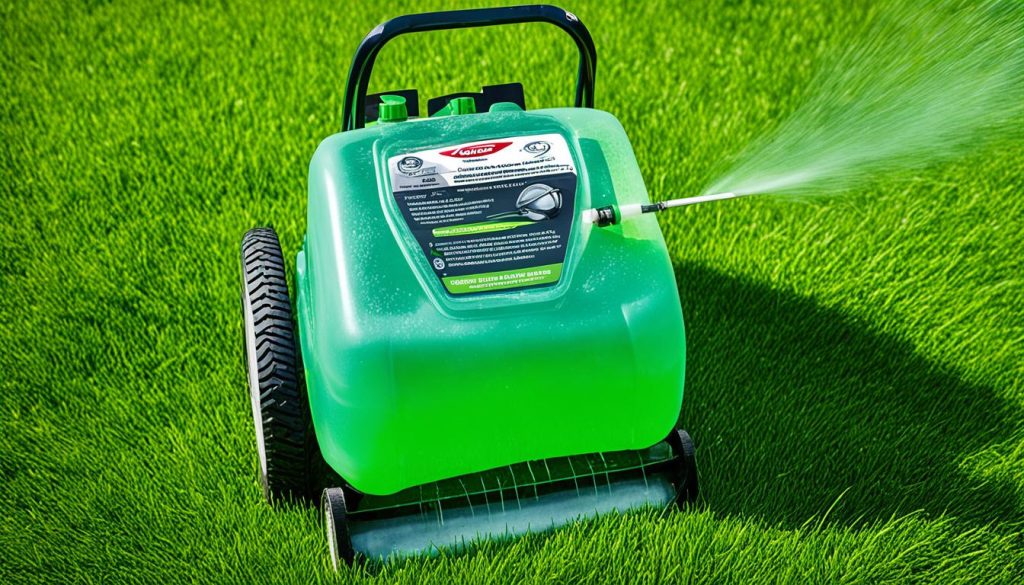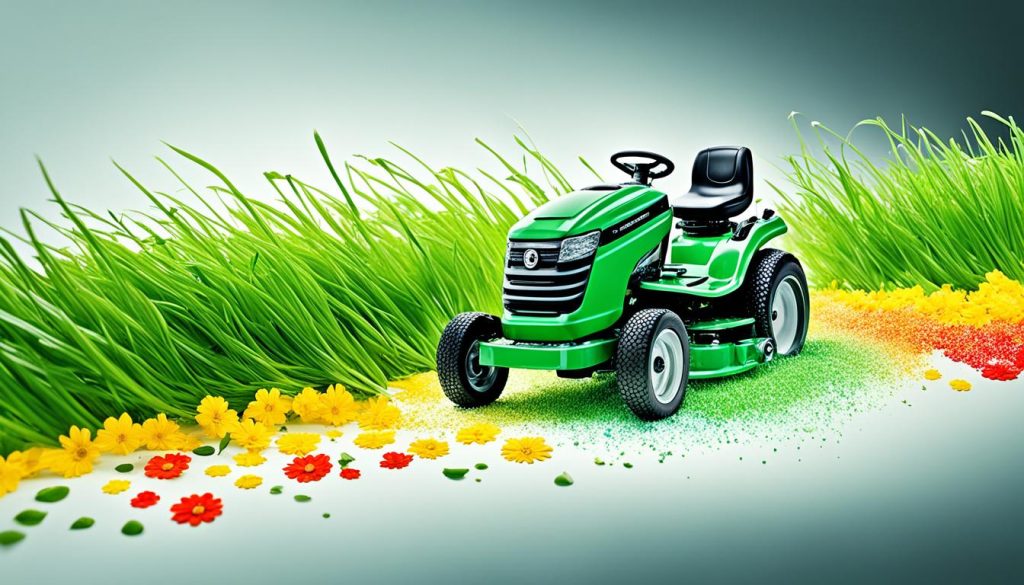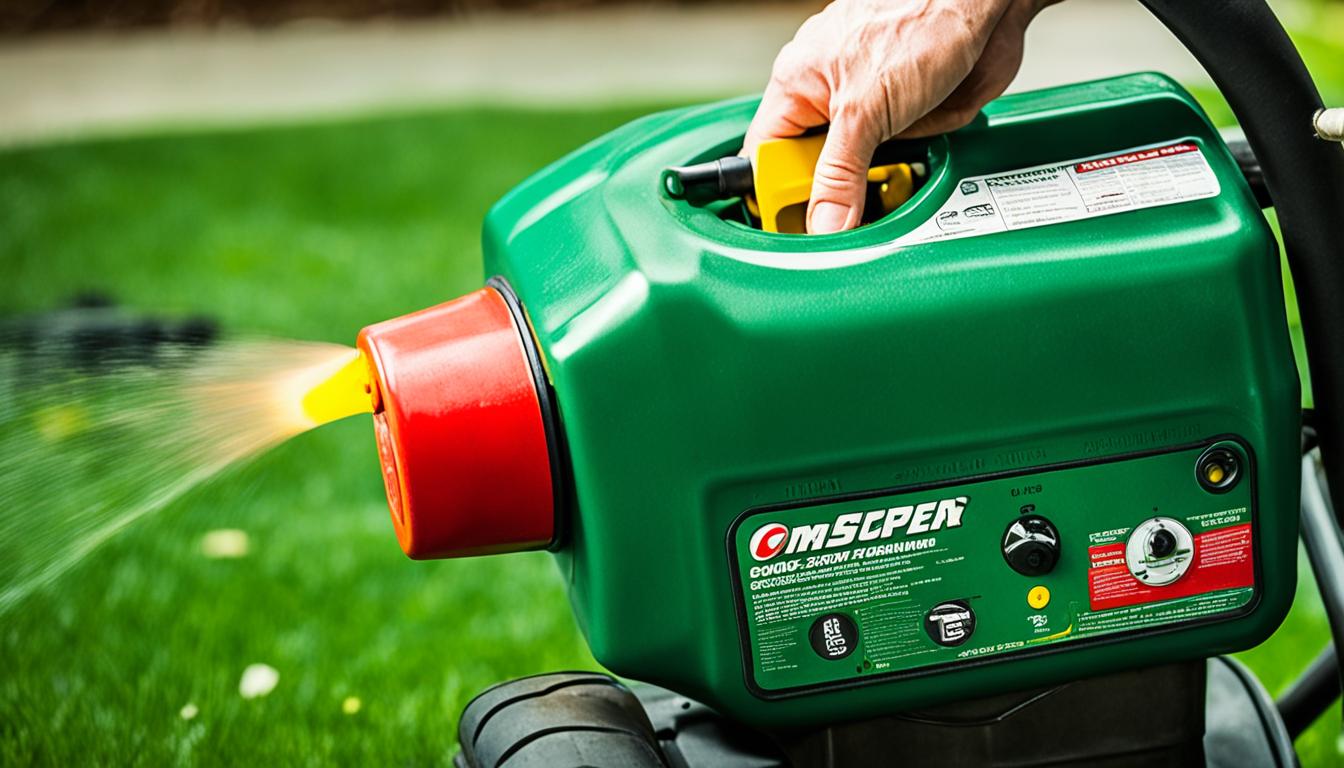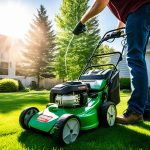When it comes to fueling your lawn mower, choosing the right type of gas is essential for optimal performance and longevity. But with so many options available, it can be confusing to determine what type of gas is best for your specific mower. Should you use regular unleaded gasoline? Or is there a specific fuel type that will ensure your mower runs smoothly and efficiently? In this article, we’ll explore the different types of gas for lawn mowers and provide expert guidance to help you make the right choice.
Key Takeaways:
- Choosing the right gas is crucial for optimal lawn mower performance and engine health.
- Clean, fresh, unleaded gasoline with the appropriate octane rating is recommended.
- Avoid excessive ethanol content and unapproved fuel types to prevent potential damage and warranty voidance.
- Proper fuel storage and maintenance, such as using a fuel stabilizer, can help ensure fuel freshness and prevent fuel system issues.
- Seek expert advice, such as from Briggs & Stratton, for specific guidance on fuel selection for your equipment.
Fuel Storage Safety Tips
Proper fuel storage is essential to maintain the performance and longevity of your lawn mower. If you’re storing your mower or power equipment for more than 30 days, it’s important to prevent stale fuel. Stale fuel can lead to engine damage, so it’s recommended to use a fuel stabilizer, such as Briggs & Stratton fuel stabilizer, designed for small engines. The fuel stabilizer should be added according to the instructions and allowed to circulate through the fuel system by running the engine for 2 minutes. It’s also important to store the lawn mower or equipment in a clean and dry place for up to 24 months. If the gasoline in the engine has not been treated with a fuel stabilizer, it should be drained into an approved container.
Benefits of Fuel Stabilizer:
- Prevents fuel degradation
- Extends fuel shelf life
- Helps protect against corrosion
- Prevents varnish and gum buildup in the fuel system
- Improves engine performance
Using a fuel stabilizer is a simple yet effective step to ensure that your stored fuel remains fresh and ready for use when you need it. By adding a fuel stabilizer to your lawn mower or power equipment, you can minimize the risk of fuel-related issues and keep your equipment running smoothly.
Fuel Recommendation for High Altitude Climates
If you live in a high altitude climate, it’s important to adjust the fuel recommendation for your lawn mower. The air quality and density change at high elevations, affecting how the engine operates. Standard fuel may not provide optimal performance in these conditions.
At altitudes over 5,000 feet, it is recommended to use a minimum of 85 octane gasoline for your lawn mower. This higher octane rating helps compensate for the thinner air and ensures proper combustion.
However, it’s important to note that simply using higher octane fuel may not be sufficient. To remain emissions compliant and prevent issues such as decreased performance and increased fuel consumption, it’s necessary to make high altitude adjustments. These adjustments help optimize engine operation in high altitude conditions.
It’s worth mentioning that there are high altitude kits available for some lawn mower models. These kits include parts and instructions for modifying the carburetor to suit the local altitude. However, it’s important to check the manufacturer’s recommendations regarding the use of high altitude kits as they may not be necessary or compatible for altitudes below 2,500 feet.
By following the appropriate fuel recommendations and making high altitude adjustments where necessary, you can ensure your lawn mower performs at its best in high altitude climates.
Mixing Oil & Fuel for Small Engines
In order to ensure the proper functioning and longevity of small engines, it is essential to adhere to the manufacturer’s guidelines when it comes to mixing oil and fuel. Following the recommended ratios and using the correct type of oil and fuel for your specific engine is crucial. Let’s explore the guidelines for both 4-stroke and 2-stroke engines:
For 4-stroke cycle spark ignited engines:
It is not recommended to mix oil in gasoline or modify the engine to run on alternative fuels. Doing so can result in damage to the engine components and may void the warranty. Stick to using the appropriate fuel type as specified by the manufacturer.
For 2-stroke cycle spark ignited engines:
A high-quality 2-cycle oil should be mixed with gasoline at a specific ratio, typically 50:1. These engines require a mixture of oil and fuel for proper lubrication and combustion. Always consult the Briggs & Stratton manual or reach out to a local service dealer to obtain the precise information regarding the type of oil and the correct mixing ratio for your specific engine model.
| Engine Type | Oil and Fuel Mixing Guidelines |
|---|---|
| 4-stroke | Do not mix oil in gasoline |
| 2-stroke | Mix high-quality 2-cycle oil with gasoline at the specified ratio (e.g., 50:1) |
By following the manufacturer’s recommendations for mixing oil and fuel, you can ensure that your small engine operates efficiently and avoids potential damage or warranty concerns. Remember, when it comes to small engines, precision and compliance with guidelines are key. Always consult the appropriate documentation or seek professional advice to guarantee the best performance and longevity for your equipment.
Ethanol and Lawn Mower Gas
Ethanol gasoline blends have become increasingly common at gas stations, but they may not be the best choice for outdoor power equipment. The use of ethanol in fuel can have detrimental effects on smaller engines, such as those found in lawn mowers. Derived from corn and sugar, ethanol has a higher combustion temperature compared to gasoline, which can lead to damage to engine parts and reduced performance.
Furthermore, ethanol has the tendency to attract moisture, which can cause phase separation and water settling in the fuel tank. This accumulation of water can lead to corrosion and the clogging of the fuel system, resulting in starting issues and costly repairs. Therefore, it is recommended to use gasoline with the lowest ethanol content possible or opt for ethanol-free gas specifically designed for small engines.
By choosing fuel with reduced or no ethanol, you can minimize the potential problems caused by its combustion characteristics and moisture absorption. This, in turn, helps to maintain the longevity and efficiency of your lawn mower or other outdoor power equipment.

Note: The image above visually represents the potential impact of ethanol in lawn mower gas.
Tips for Choosing the Right Gas
When it comes to choosing the best gas for your lawn mower or small engine, several factors should be considered to ensure optimal performance and longevity. It’s crucial to select the right fuel that meets the specific requirements of your equipment. Here are some essential tips to help you make an informed decision:
1. Ethanol Content
When purchasing gas for your lawn mower, it’s important to consider the ethanol content. Ethanol is a type of alcohol added to gasoline and can have an impact on small engines. Fuels with lower ethanol content are generally preferred to minimize potential damage to the engine. Look for gasoline labeled as ethanol-free or with the least amount of ethanol possible.
2. Octane Rating
Another crucial factor to consider is the octane rating of the gas. It’s recommended to use unleaded gasoline with a minimum octane rating of 87. Higher octane ratings are not necessary and can be more expensive without providing any significant benefits. Using fuels with lower octane ratings can cause engine knocking and reduce performance.
3. Avoid E-15 Gasoline
Avoid using gasoline labeled as E-15, which contains 15% ethanol. This fuel blend is not suitable for smaller engines and can potentially lead to damage. It’s always safer to stick with fuels containing lower ethanol content.
4. Precision-Engineered Fuels
Precision-engineered fuels specifically formulated for small engines can be a great option. These fuels are designed to provide optimal performance, reduce engine deposits, and minimize the risk of fuel system issues. Consider using these fuels for both 2-cycle and 4-cycle engines in various outdoor power equipment.
By following these tips and choosing the right gas, you can help ensure that your lawn mower or small engine operates at its best. Remember to prioritize ethanol content, octane rating, and consider using precision-engineered fuels for maximum performance and longevity.
| Factors to Consider | Tips |
|---|---|
| Ethanol Content | Choose ethanol-free or low ethanol content fuels |
| Octane Rating | Use unleaded gas with a minimum octane rating of 87 |
| Avoid E-15 Gasoline | Stay away from gasoline labeled as E-15 |
| Precision-Engineered Fuels | Consider using precision-engineered fuels for optimal performance |
Preventing Fuel System Issues
To prevent fuel system issues and ensure your lawn mower starts smoothly, it’s essential to take proper care of the fuel. This includes using clean and fresh fuel, avoiding stale gas, and adding a fuel stabilizer. Storing the lawn mower or equipment in a clean and dry place when not in use can also help maintain the fuel system’s integrity. Additionally, running the engine until the gas is completely gone after the last mow of the season can prevent fuel deterioration, corrosion, and the formation of gummy deposits that can clog the fuel system.
Proper Fuel Maintenance Checklist
- Use clean and fresh fuel
- Avoid using stale gas
- Add a fuel stabilizer to prevent degradation
- Store the lawn mower or equipment in a clean and dry place
- Run the engine until the gas is completely gone after the last mow of the season
By following these steps, you can ensure that your lawn mower’s fuel system remains in optimal condition, minimizing the risk of starting issues and costly repairs.
| Common Fuel System Issues | Prevention Tips |
|---|---|
| Stale fuel | Use fresh fuel and add a fuel stabilizer |
| Corrosion and clogging of fuel system | Store equipment in a clean and dry place and run engine until gas is completely gone after the last mow of the season |
| Gummy deposits in fuel system | Run engine until gas is completely gone after the last mow of the season |
By maintaining your lawn mower’s fuel system, you can prevent these common issues and ensure reliable starting and optimal performance.
Minimizing Ethanol Absorption
Minimizing ethanol absorption is essential for maintaining the integrity of your lawn mower’s fuel system. Since ethanol has the ability to absorb moisture from the air, it’s important to take proactive steps to minimize its presence in the fuel tank. This section provides some valuable strategies to help you achieve this goal.
Using Gas Without Ethanol
One effective way to minimize ethanol absorption is by using gas that doesn’t contain any ethanol whenever possible. Ethanol-free gas is less prone to attracting moisture and can help prevent potential fuel system issues. Check with your local gas stations to see if they offer ethanol-free gasoline options.
Limiting Ethanol Content
If you’re unable to find ethanol-free gas and must use a fuel containing ethanol, it’s crucial to ensure that it doesn’t exceed 10% ethanol content. Pay attention to the labels on the fuel pumps to make informed choices about the ethanol content of the gas you’re purchasing. Keeping the ethanol content below 10% can significantly reduce the risk of moisture absorption.
Using a Fuel Stabilizer
Another effective measure to minimize ethanol absorption and prevent water separation in the fuel system is by adding a fuel stabilizer. By adding a fuel stabilizer to your lawn mower engine at the beginning and end of each season, you can help minimize the risk of moisture accumulation and potential damage caused by the presence of moisture in the fuel system. Follow the manufacturer’s instructions when using a fuel stabilizer.
By implementing these strategies, you can reduce the potential for ethanol absorption in your lawn mower’s fuel system. Minimizing moisture accumulation will help maintain the overall performance and longevity of your equipment.
Fuel Freshness and Volatility
Fuel freshness is a crucial factor in maintaining engine performance and preventing starting issues in your lawn mower. Over time, fuel can deteriorate, leading to the loss of volatile compounds that are essential for efficient combustion. When these volatile components are depleted, the engine may experience difficulties starting, resulting in frustration and delays with your mowing tasks.
As fuel evaporates, it can leave behind sticky residues known as gummy deposits. These deposits can harden over time and create blockages in the fuel system, hampering proper fuel flow and potentially causing engine malfunctions. To keep your lawn mower running smoothly, it’s important to address fuel freshness and prevent the formation of these deposits.
To illustrate the importance of fuel freshness and volatility, take a look at the table below:
| Fuel Freshness | Effect on Engine Performance |
|---|---|
| Fresh Fuel (Purchased within 30 days) | Optimal engine performance, easy starting |
| Stale Fuel (Over 30 days old) | Difficulties starting, decreased engine performance |

Tips for Fueling Up
Proper fueling techniques are essential for fueling your lawn mower or outdoor power equipment and ensuring optimal performance and longevity. Following these tips can help you fuel up safely and efficiently.
- Use the right type of fuel: As discussed earlier, it’s crucial to use the correct type of fuel for your lawn mower or outdoor power equipment. Using clean, fresh gasoline with the appropriate octane rating is essential to prevent engine damage and maintain optimal performance.
- Follow safety guidelines: When fueling up, always prioritize safety. Avoid spilling fuel on the engine or any other hot surfaces to prevent accidents or potential fire hazards. Handle fuel containers with care and keep them away from open flames or sparks.
- Avoid overfilling the gas tank: Overfilling the gas tank can lead to fuel overflow and potential hazards. Be mindful of the fuel level and stop filling when the tank is nearly full. Follow the manufacturer’s recommendations for proper fuel capacity.
- Promptly clean up spills: If any fuel spills occur during the fueling process, it’s important to clean them up promptly. Wipe up any spills using a cloth or absorbent material to prevent slipping, potential damage to the equipment, or environmental contamination.
- Properly dispose of fuel containers: When you’re finished fueling, ensure that you dispose of fuel containers properly. Check local regulations for guidelines on how to properly dispose of gasoline containers in an environmentally friendly manner.
By following these fueling tips, you can maintain the performance and longevity of your lawn mower or outdoor power equipment and ensure safe and efficient operation.
Importance of Fuel Selection
Choosing the right fuel for your lawn mower or small engine is crucial in ensuring its performance and longevity. The fuel you select can have a significant impact on how well your equipment operates and how long it lasts. By understanding the importance of fuel selection, you can make informed decisions and avoid potential issues.
Impact of Fuel on Performance
The type of fuel you use directly affects the performance of your lawn mower or small engine. Using clean and fresh unleaded gasoline with the appropriate octane rating is essential for optimal engine operation. Fuel with excessive ethanol content can lead to starting problems, decreased performance, and increased fuel consumption. It can also result in heightened emissions, which can be harmful to both the environment and the engine.
Fuel-Related Issues
Poor fuel selection can lead to a variety of issues with your equipment. Using unapproved fuel types or fuels with excessive ethanol content can cause starting issues, engine misfires, and reduced power output. It can also lead to fuel system clogs, corrosion, and other related problems. Fuel-related issues can result in costly repairs and unnecessary downtime for your equipment.
Choosing the right fuel is crucial for the health and longevity of your lawn mower or small engine. It’s important to prioritize fuel selection and avoid using fuels that could potentially harm your equipment. By selecting clean and fresh unleaded gasoline with the appropriate octane rating, you can ensure optimal performance and minimize the risk of fuel-related issues.
| Fuel Selection Tips |
|---|
| Choose clean and fresh unleaded gasoline |
| Check the appropriate octane rating for your equipment |
| Avoid fuels with excessive ethanol content |
| Follow the manufacturer’s recommendations for fuel type |
By following these fuel selection tips, you can ensure optimal performance and prolong the life of your lawn mower or small engine. Don’t compromise on fuel quality, and prioritize the health of your equipment with the right fuel selection.
Protecting Your Investment
Proper maintenance is essential for protecting your investment in a lawn mower or outdoor power equipment. This includes paying attention to fuel-related considerations to prevent equipment damage and ensure the longevity of your machine. By using the recommended fuel type and following storage and fueling guidelines, you can keep your equipment in excellent condition.
Using the right fuel type is crucial for the optimal performance and operation of your lawn mower. Stick to the manufacturer’s recommendations to avoid fuel-related equipment damage. Using unapproved fuel types or modifying the engine to run on alternative fuels can void the engine warranty, leaving you responsible for any repairs.
In addition to using the right fuel, following proper storage and fueling practices is essential. Storing your equipment in a clean and dry place when not in use helps prevent damage from exposure to the elements. When fueling up, make sure to use the correct fuel type and avoid spilling fuel on the engine or other hot surfaces that can cause accidents or fire hazards.
By prioritizing fuel-related maintenance and adhering to manufacturer guidelines, you can protect your investment and prolong the life of your lawn mower. Taking these steps will not only save you money on potential repairs but also help ensure that your equipment runs smoothly and efficiently for years to come.
Fuel-Related Equipment Damage
Using the wrong fuel type or not following proper fueling practices can cause significant damage to your lawn mower or outdoor power equipment. Fuel-related issues can lead to engine problems, decreased performance, increased fuel consumption, and even complete engine failure.
One common fuel-related problem is the use of ethanol-blended gasoline, which can be harmful to small engines. Ethanol can attract moisture, leading to phase separation and water settling in the fuel tank. The presence of excess moisture can cause corrosion and clogging of the fuel system, resulting in starting issues and expensive repairs.
Another issue arises from using unapproved fuel types or modifying the engine to run on alternative fuels. Manufacturers design engines to operate using specific fuel types, and using anything else can cause irreversible damage to engine components. In addition to the financial burden of repair or replacement, using unapproved fuel can void the engine warranty.
Engine Warranty Protection
The engine warranty provided by the manufacturer is a valuable asset that protects you from unexpected repair costs. However, it’s essential to understand that not following the recommended fuel guidelines can void this warranty.
Using unapproved fuel types or modifying the engine to run on alternative fuels is considered a breach of the manufacturer’s guidelines. If any damage occurs due to using these fuels or making modifications, you may be responsible for the repair costs, even if the issue falls within the warranty period.
By using the recommended fuel type and following proper maintenance procedures, you ensure that your lawn mower remains eligible for warranty coverage. This can save you from significant out-of-pocket expenses in case of any engine-related issues.
Expert Advice from Briggs & Stratton
For expert advice on choosing the right fuel for your lawn mower or small engine, look no further than Briggs & Stratton. As industry leaders in small engine expertise, they can provide you with valuable guidance tailored to your specific equipment. Whether you have questions about fuel types, storage tips, or fuel system maintenance, their team of experts is ready to assist you.
Choosing the proper fuel is essential for maximizing performance and maintaining warranty coverage. With Briggs & Stratton’s extensive knowledge, you can be confident that you’re using the right fuel to keep your equipment running smoothly.
| Benefits of Briggs & Stratton Expert Advice | How it Helps You |
|---|---|
| Customized Guidance | Ensure the fuel you use is specifically suited to your lawn mower or small engine, optimizing performance and efficiency. |
| Equipment Specific Recommendations | Receive precise recommendations based on your machine’s make and model, guaranteeing the best fuel selection. |
| Maximize Performance | Get the most out of your equipment by utilizing the fuel that is formulated to deliver peak performance. |
| Maintain Warranty Coverage | By following Briggs & Stratton’s fuel advice, you can ensure that your equipment remains under warranty. |
When it comes to lawn mower fuel advice, trust the small engine experts at Briggs & Stratton. They have the knowledge and experience to guide you in selecting the right fuel for your specific needs, helping you maintain the performance and durability of your lawn mower or small engine.
Fuel Tips Video Transcript
In a video transcript provided by Toro, some essential fuel tips are highlighted. These tips aim to guide users in making informed decisions to maximize the performance and longevity of their lawn mowers. The video offers valuable advice on fuel-related topics such as minimizing ethanol content, fuel storage, and usage techniques. Here are some key takeaways from the video:
Minimize Ethanol in the Fuel
- Minimizing ethanol content in the fuel helps reduce moisture absorption and potential damage to the engine.
- Ethanol attracts moisture, leading to phase separation and water settling in the fuel tank, which can cause corrosion and clogging of the fuel system.
- It is recommended to choose gasoline with the lowest ethanol content possible or opt for ethanol-free gas for small engines.
Keep the Fuel Fresh
- Purchasing and using only enough fuel for 30 days or less helps ensure fuel freshness.
- Adding a fuel stabilizer to the fuel tank can help prevent fuel deterioration and maintain optimal performance.
Use the Right Gas
- Unleaded gas with a minimum octane rating of 87 is recommended for lawn mowers and small engines.
- Avoid using gas labeled E-15, which contains 15% ethanol, as it can be harmful to smaller engines.
Empty the Fuel Tank
- Emptying the fuel tank after the last mow of the season helps prevent fuel deterioration and the formation of deposits that can clog the fuel system.
Following these fuel tips can help users maintain their lawn mowers and ensure optimal performance throughout the mowing season. For further guidance and assistance, it is recommended to consult the manufacturer or experts at Toro.
Remember to refer to the video for a visual demonstration and additional insights on fuel-related best practices.
Conclusion
Choosing the right gas for your lawn mower is essential for maintaining optimal performance and engine health. To ensure the best results, it’s crucial to use clean, fresh, unleaded gasoline with the appropriate octane rating. Avoiding excessive ethanol content and unapproved fuel types is also essential to prevent potential damage and avoid voiding your warranty.
Proper fuel storage and maintenance practices can further contribute to the longevity of your equipment. Using a fuel stabilizer and emptying the fuel tank when storing your mower for extended periods will help maintain fuel freshness and prevent fuel system issues. By following these tips and seeking expert advice when needed, you can make informed decisions about the type of gas for your lawn mower, allowing it to run at its peak performance for years to come.
When it comes to choosing the best gas for your lawn mower, prioritize the health and efficiency of your engine. With clean fuel, proper storage, and regular maintenance, your lawn mower will continue to provide reliable service and ensure a well-maintained yard. Remember to consult your lawn mower’s manufacturer guidelines and reach out to experts, such as those at Briggs & Stratton, for any specific advice or concerns relating to your equipment.





